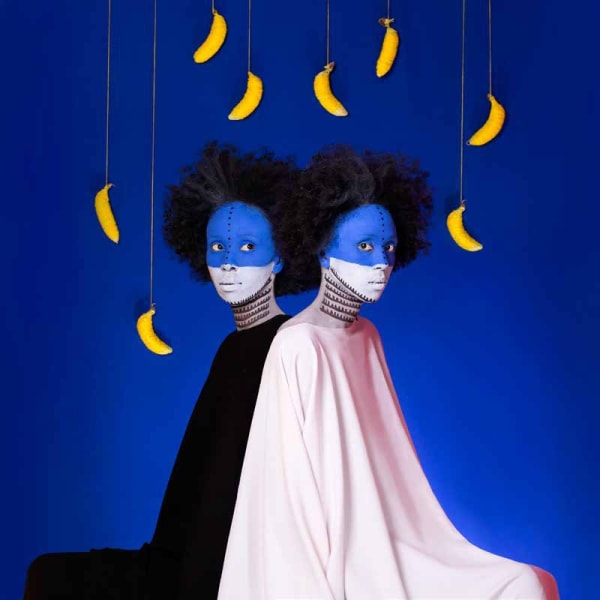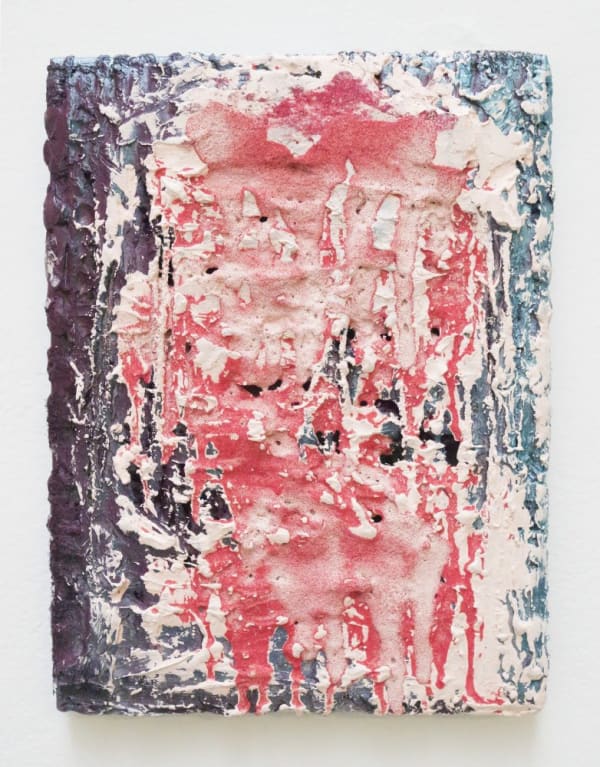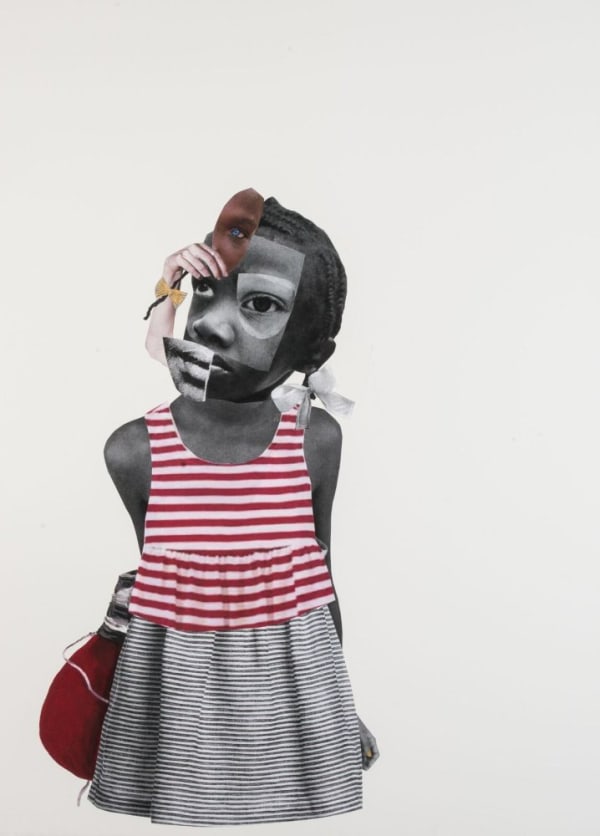Jenkins Johnson Gallery is pleased to present the work of Lalla Essaydi, Aida Muluneh, Blessing Ngobeni, Deborah Roberts, and Vaughn Spann.
New York-based Lalla Essaydi, who was educated in Boston and Paris, grew up in Morocco, and then spent a substantial period in Saudi Arabia. These experiences with traditional Islamic life are fundamental to her unique approach of examining the identity of Muslim women. Islam, resistance, and feminism permeate Essaydi’s arresting photographs that question modern day hierarchies within Eastern culture, and the voyeuristic European tradition of depicting Arab women languishing alone or in their harem. Woeful of such Western misrepresentations of the eroticized Arab female body, Essaydi evokes these 19th-century painters, such as Ingres, Delacroix, and Gérôme, by placing her models in similar classic odalisque poses, which serves to deconstruct historical and contemporary views of Arab women in Western art. Essaydi is currently featured in Alchemy: Transformations in Gold at the Akron Art Museum.
Bullets Revisited is a haunting and visually arresting body of work created as a response to the 2011 regional revolutions in the Middle East. In this series, models lay on glittering beds, in front of gold mosaics, and covered in shining clothing and jewelry, which upon closer inspection is realized to be bullet casings. A domestic scene converts into a psychological one, reflecting on violence in contemporary society. “During the time of the Arab Spring, at the beginning, I was so enchanted how women were at the forefront of everything. And then once the [new] governments were in place, the first rule they want is to put women back again….My response to it is to use something that is so beautiful but when you think about it is really significant of violence, and violence on women to protect the domestic space.”
Ethiopian photographer, artist, and cultural entrepreneur, Aida Muluneh’s vibrant photographs express what it is to be an African woman, to encapsulate gender and identity, and to situate it within the colonial experience. Muluneh’s recent photographs from the series The Memory of Hope, explores the optimism that once defined her youth. She recalls what is was like to embrace hope with excitement and confidence, and having a strong opinion regarding what was right and wrong in the world. The reality she discovered with age reflected a much darker side of humanity than she could ever have expected. Through the series, Muluneh aims to amplify what we try not to hear, nor see. She makes us witnesses as she takes action.
She is currently participating in the group show Being: New Photography 2018 at MoMA. She is also at Purdue University with her solo exhibition Aida Muluneh: The Memory of Hope, as well as documenting the Ethiopian drought as a photojournalist for the Washington Post. Muluneh participated in Afrique Capitales in Paris 2017 and in the Dakar Biennale in 2016. She uses art to promote cultural development through her organization DESTA (Developing and Educating Society Through Art), and she is the founder of the Addis Foto Fest, the first international photography festival in Ethiopia. She is in the permanent collection of the Smithsonian’s National Museum of African Art. Muluneh received the 2007 European Union Prize in the Rencontres Africaines de la Photographie, in Bamako, Mali and was the 2010 winner of the CRAF International Award of Photography in Spilimbergo, Italy.
Blessing Ngobeni was recently named by Phaidon’s Vitamin P3 and Artspace as one of the “most important African painters working today,” alongside Njideka Akunyili Crosby and Meleko Mokgosi. His works reflect on slavery as a historical, psychological and contemporary subject. The colonial practice of slavery had a violent and physically destructive impact on African people and left deep psychological scars that have affected generations. Although the practice was formally abolished, it has continued to this day under a new generation of post-colonial slave masters. Slavery not only exists in the historical sense, but also psychologically as South Africans are still coming to terms with the catastrophic implementation of institutionalized racism during Apartheid. As a black, South African male, Ngobeni wrestles with the injustices of inherited economic disparity. The same government that promised to redistribute land, access to education and resources is riddled with corruption that stunts all efforts to effect change. Ngobeni offers a vision of post-colonial South Africa that is staggeringly complex, with a renewed focus on slavery as a point of departure for this body of work.
Based in Austin, Texas, Deborah Roberts utilizes collage to investigate issues of race and beauty in the context of African-American women’s bodies, subverting the stereotypes surrounding them with biting humor. The girls Roberts portrays in her work arise out of the rigid American beauty standards propagated by the media that privilege whiteness and youth. By combining interspersed images of iconography, such as Afros, large hoop earrings, nappy hair, and big red lips, each component has character and agency in the complicated narratives of American, African American, and Art history. Visually, the viewer must look through multiple layers, which provide double meanings and symbols to be read. Commenting on the environmental pressures of the media on young African-American girls, her portraits appear, both innocent and monstrous, shy and confrontational, self-asserting and impressionable. She states her goal is “to show women of color, both young and old, that their beauty is not to be an object of convenience or ridicule and should not be made void or bought and sold at a moment’s notice, but is to be cherished and honored, as all women should be.”
Deborah Roberts is currently exhibiting in “Fictions” at the Studio Museum in Harlem and will be exhibiting in a solo show at Jenkins Johnson Gallery in January 2018 in conjunction with “Deborah Roberts: The Evolution of Mimi” at the Spelman College Museum of Fine Art. She has recently exhibited at George Washington Carver Museum in Austin, Texas, the National Museum of Mexican Art in Chicago, Illinois, the Mission Cultural Center for Latino Arts in San Francisco, California, Art Palace in Houston, Texas, and ongoing participation in the Viewing Program at the Drawing Center in New York, New York. Roberts is a 2016-2017 Pollock-Krasner grantee, and a recipient of the Ginsberg-Klaus Fellowship, the Presidential Point of Light, and Syracuse Graduate Fellow Award. She completed the Ox-Bow Art Residency and earned her MFA from Syracuse University.
Vaughn Spann works with non-traditional materials to push against Western modes of painting. In a society riddled with racial, class and structural issues, he asks how we can redefine power and the slippage of taste? Compelled by a variety of materials, such as towels and yarn, Spann investigates formal relationships while drawing parallels to the body. His approach to painting is part intuition, part chance and part execution. With accumulation and physical repetition, he is intrigued by notions of touch as they relate to time, memory and labor.
Spann is currently completing his MFA in Painting & Printmaking at the Yale School of Art. He is a recipient of the 2017 Alice Kimball Traveling Fellowship and has participated in group exhibitions at institutions including RushArts in Chelsea, New York, The Reginald Lewis Museum in Baltimore, Maryland, The Newark Museum in Newark, New Jersey, and Cultural Center of African Diaspora Institute (CCCADI) in New York City. Spann received his BA in Studio Art from Rutgers State University in Newark, New Jersey.








